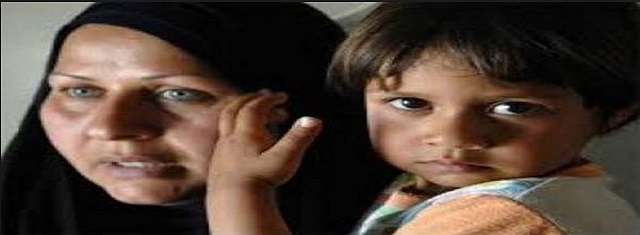Arts
Moral Neurosis and Its Relationship with Spiritual Intelligence in Widows
MA Degree in Arts in / Mental Health

A widow with her son
Supervised by
Assist. Prof.
Dr. Safaa Husein Moahamed Ali
Abstract
As a result of struggles and conflicts experienced by our societies in almost all fields of life, it becomes necessary to put interest on individuals and knowing if this will generate a neurosis in them or not, especially widows who experience so hard, strenuous and onerous situations, when they become widows and lose their supporters and sustenance in this life, in addition to our society limited view towards those women who lose their husbands and their difficult living circumstances. Towards this state of widowhood and this closed view of the society, widows feel alone in this world after they were feeling that they did not need anyone to help in the past.
Assist. Prof.
Dr. Safaa Husein Moahamed Ali
Abstract
As a result of struggles and conflicts experienced by our societies in almost all fields of life, it becomes necessary to put interest on individuals and knowing if this will generate a neurosis in them or not, especially widows who experience so hard, strenuous and onerous situations, when they become widows and lose their supporters and sustenance in this life, in addition to our society limited view towards those women who lose their husbands and their difficult living circumstances. Towards this state of widowhood and this closed view of the society, widows feel alone in this world after they were feeling that they did not need anyone to help in the past.
From the other hand, if a widow is characterized by being intelligent, is this will lead to decrease this neurosis or not? However, noogenic neurosis represents one of the effective variables in individuals' life according to psychologists, especially Viktor Frankel. From the other side, spiritual intelligence has great importance in individuals' life.
In order to achieve the aims of this research, the researcher has relied on the following:
In order to achieve the aims of this research, the researcher has relied on the following:
1- Constructing a scale for measuring noogenic neurosis which consists of (32) items in its final form after ascertaining its validity and reliability. These items are distributed on three components, namely, (losing the freedom of will, losing the will in creating meaning and lacking of meaning in life).
2- Constructing a scale for measuring spiritual intelligence which consists of (42) items in its final form after ascertaining its validity and reliability.
2- Constructing a scale for measuring spiritual intelligence which consists of (42) items in its final form after ascertaining its validity and reliability.
These items are distributed on five components, namely, (the ability of superiority and sublimity, the ability in engaging in profound spiritual states of conscious, the ability of utilizing the spiritual resources in order to solve life problems, the ability of involvement in virtuous and worthy behavior and the ability to invest activities, events and relationships with others).
In order to achieve the objectives of the research, the researcher has administered the two scales on a sample consists of (200) widows in Baghdad governorate in (2016) and then analyzed the data by using the statistical packages for social sciences (SPSS). However, the researcher has used the following statistical means:
In order to achieve the objectives of the research, the researcher has administered the two scales on a sample consists of (200) widows in Baghdad governorate in (2016) and then analyzed the data by using the statistical packages for social sciences (SPSS). However, the researcher has used the following statistical means:
1- T-test for two independent samples.
2- Pearson correlation coefficient.
3- T-test for Person correlation coefficient.
4- Alpha-Cronbach for internal consistency.
5- Three way ANOVA.
6- Multi-regression analysis.
The results of the study are as follows:
1- Widows suffer from moral neurosis.
2- Widows enjoy a spiritual intelligent.
3- There is no statistically significant relationship between moral neurosis and a spiritual intelligent.
2- Pearson correlation coefficient.
3- T-test for Person correlation coefficient.
4- Alpha-Cronbach for internal consistency.
5- Three way ANOVA.
6- Multi-regression analysis.
The results of the study are as follows:
1- Widows suffer from moral neurosis.
2- Widows enjoy a spiritual intelligent.
3- There is no statistically significant relationship between moral neurosis and a spiritual intelligent.
4- There are no statistically significant differences between moral neurosis and a spiritual intelligent according to age.
5- There are statistically significant differences between moral neurosis and a spiritual intelligent according to residence.
6- There are no statistically significant differences between noogenic neurosis and a spiritual intelligent according cause of being widow.
7- All the components of spiritual intelligence participate in noogenic neurosis.
Finally, the researcher has arrived at a number of recommendations and suggestions.
5- There are statistically significant differences between moral neurosis and a spiritual intelligent according to residence.
6- There are no statistically significant differences between noogenic neurosis and a spiritual intelligent according cause of being widow.
7- All the components of spiritual intelligence participate in noogenic neurosis.
Finally, the researcher has arrived at a number of recommendations and suggestions.
Liability for this article lies with the author, who also holds the copyright. Editorial content from USPA may be quoted on other websites as long as the quote comprises no more than 5% of the entire text, is marked as such and the source is named (via hyperlink).






